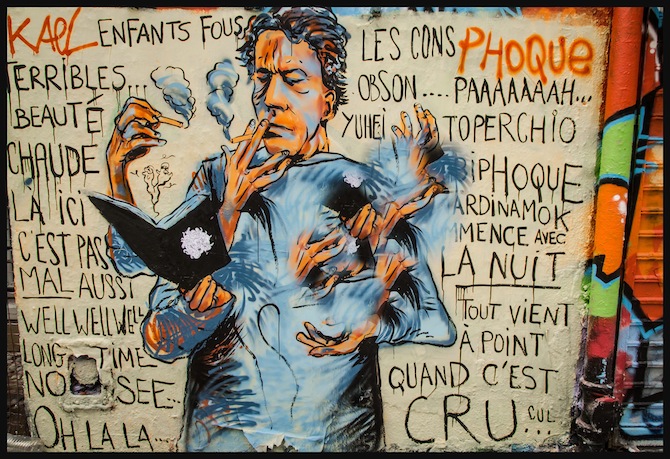The Best Christmas Gift
 11.23.2012
11.23.2012
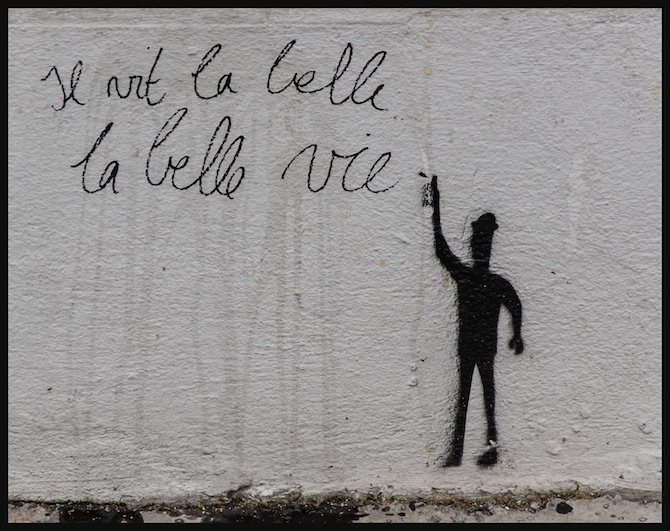
How odd it was on Thursday to hear that everyone we know in the U.S.A. was celebrating Thanksgiving, while here in Paris we heard nary a mention of turkey or pumpkin pie.
But we celebrated in our own way with our usual daily gratitude for our work, family, friends, and our lives together in Paris.
Moving on to Christmas: what is your favorite Christmas gift? I mean besides love, money and creativity—something that can be wrapped and placed under the Christmas tree.
For me, it’s always been books. Even as a child, getting a new book was bliss.
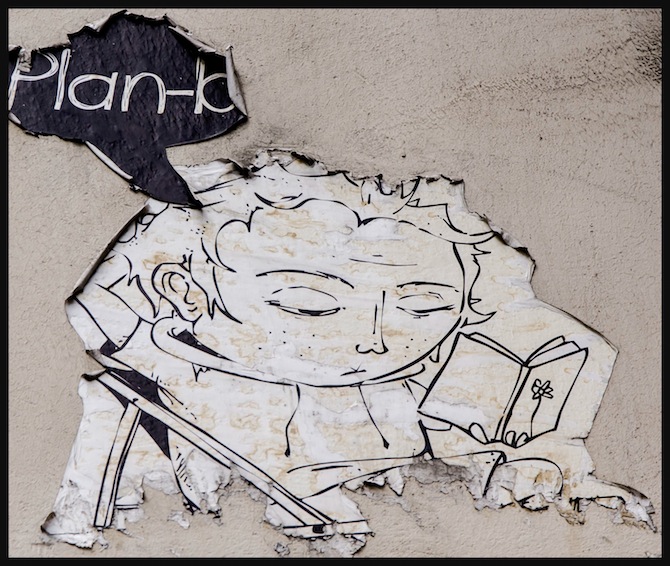
Last week, Richard and I and our nephew, Jonathan Edwards, went to Shakespeare and Company Bookstore one night to hear the American novelist, Percival Everett, read an excerpt from his novel. We’d heard him before at Antioch University in Los Angeles. But here in the bookstore, I could immediately buy one of his books.
After the reading I asked him to recommend where to begin. He suggested his comic novel, “I am Not Sidney Poitier.” Both Jonathan and I bought it, and I had the sad experience a few days ago of finishing it. Sad because the world Everett creates in this novel is so rich, so real, I didn’t want it to end. It is about the journey of a young black man, Not Sidney (yes, that is his name) from his childhood with a smart, unsentimental single mother who, through her investments, makes her son staggeringly rich. After a period of living with Ted Turner (and glimpses of Jane Fonda), Not Sidney embarks on a farcical stint at Morehouse College and a terrifying journey through the South where—okay, can’t give that away, can I?
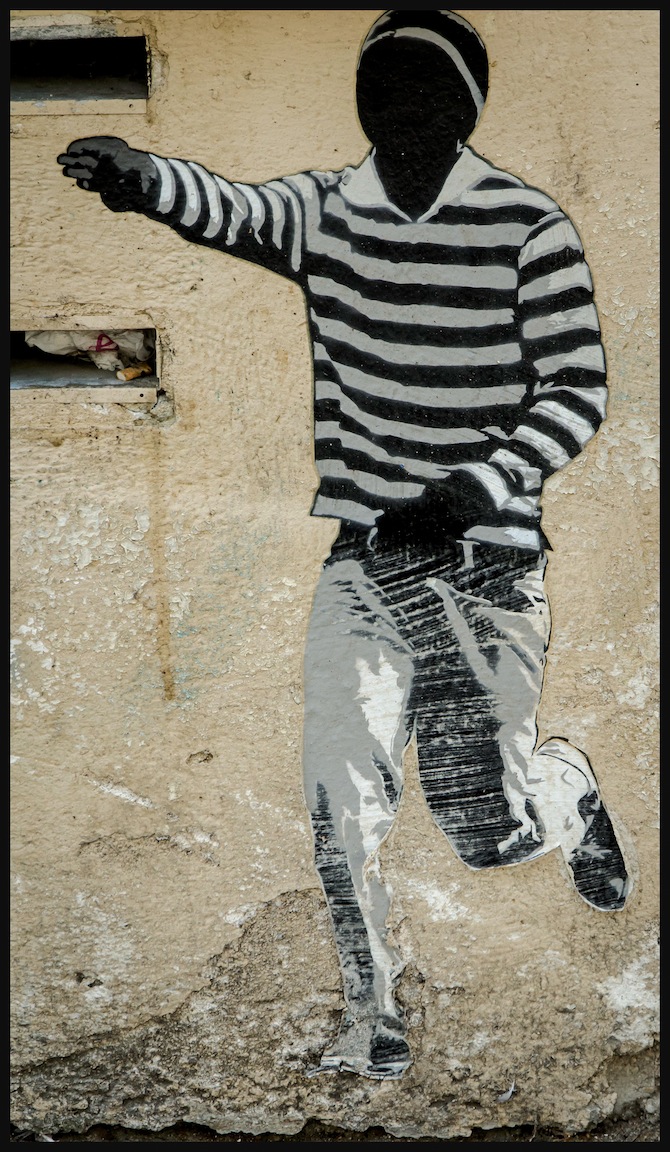
The book is full of absurdity, from a Morehouse professor named Percival Everett who teaches the Philosophy of Nonsense to his earnest students, to Not Sidney's way of handling the cruelty of frat house hazing, which made me laugh so loud I had to run into the kitchen so I wouldn’t awaken Richard.
But wait—it’s more than his humor that makes this novel so brilliant. It’s the mild temperament and voice of the narrator. While people around him are behaving savagely or absurdly, he simply observes. (Think Candide.) And slowly it dawns on the reader that this is the most eloquent telling of how it might feel to be black in the U.S.A., at least in the redneck states, of anything I’ve read. (I’m embarrassed to say I haven’t read James Baldwin’s work, but I’m going to get Giovanni’s Room next.)
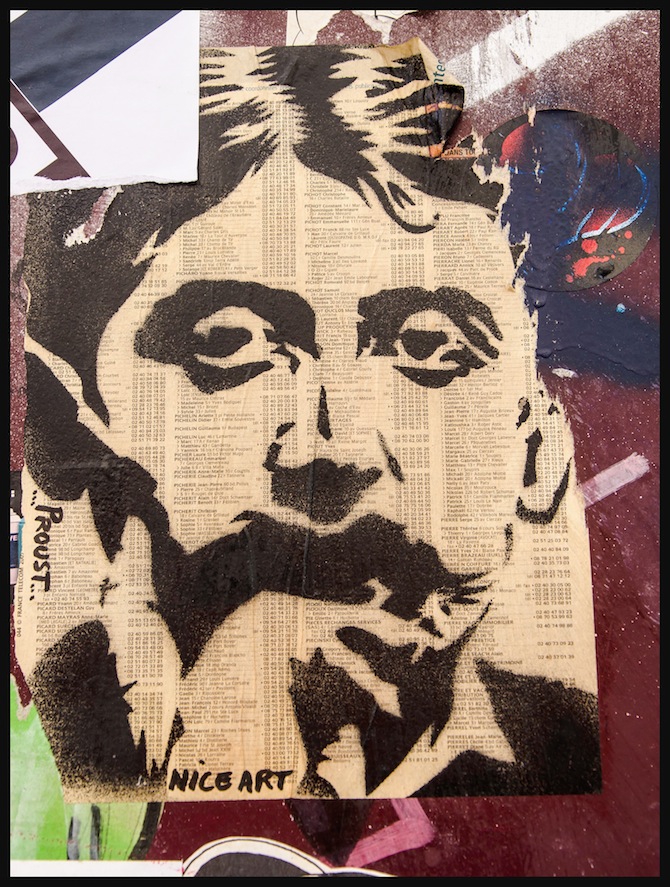 Street art by Nice Art
Street art by Nice Art
But wait—it’s even greater than this. No one has put into words better than Marcel Proust the deepest purpose of reading. Here is what he wrote in a letter:
“It is one of the great and wonderful characteristics of good books…that for the author they may be called “conclusions” but for the reader “incitements”…That is the value of reading and also its inadequacy. To make it into a discipline is to give too large a role to what is only an incitement. Reading is on the threshold of the spiritual life; it can introduce us to it: it does not constitute it.” As Alain de Botton writes in his book, How Proust Can Save Your Life, “Even the finest books deserve to be thrown aside.”
There was something about the surreal sensibility of this book that incited the first pages of a new long story (novella? novel? not sure). Inspiration: the greatest gift any book can give us.
And with that, I want to recommend a few of the most inspiring books I’ve read in the past year. Who knows, one or two of these might inspire you, or someone for whom you're looking for a gift.

Fiction
- The Certificate by Isaac Bashevis Singer (This novel was written in Singer’s sixties and is closely autobiographical, the story of a young Jewish man who arrives in Warsaw from his small Polish village in 1922. He has romantic adventures with three young women while waiting to get his certificate to go to Palestine. This is brilliant writing, the kind of voice that’s so vivid you can’t stop reading. It’s out of print, so you may have to track it down through some online used book store like Abe Books.)
- Swann’s Way by Marcel Proust, translated by Lydia Davis. (I can’t improve on Virginia Woolf’s words in a letter to Roger Fry in which she wrote, “My great adventure is really Proust. Well—what remains to be written after that? …How, at last, has someone solidified what has always escaped and made it too into this beautiful and perfectly enduring substance? One has to put the book down and gasp.”)
- The Blue Fox by Sjon (Such a strange and mysterious story told by the Icelandic writer Sjon. It takes place in Iceland and links the destinies of a hunter/priest, a blue fox, a naturalist and a girl with Down syndrome in a tale about compassion. It is a book that seems carved out of ice; it’s minimalist, poetic, and told in a distinctively Scandinavian voice that reminded me of my Norwegian-American maternal grandfather, Julius Heimark’s way of telling a story, colloquial and as simple and straightforward as The Eddas.)
- Self-Portraits: Fictions by Frederic Tuten (Imagine a series of short stories that combine the sensibility of Luis Bunuel's films with Andre Breton's writing, and you'll be half-way to the flavor of this writer's work. The stories seem to be telling an autobiographical dream narrative, sometimes erotic, sometimes hilarious (laugh out loud), and always as close to poetry as fiction gets.)
- N-W by Zadie Smith (stream of consciousness narrative of four characters, Leah, Natalie, Felix and Nathan, in present-day London. It made me think of Virginia Woolf’s Mrs. Dalloway. This is one of those books that in the first few pages is slow to get going, then you are truly inside the characters in the most satisfying way, living their life minute by minute, including some surprises that you don't see coming.)
- This is How You Lose Her by Junot Diaz (Interlinked stories about various women in the life of Yunior, a young Dominican-American man whose Don Juan ways end up breaking his own heart. Diaz’s genius is high voltage voice! You can’t put the book down.)
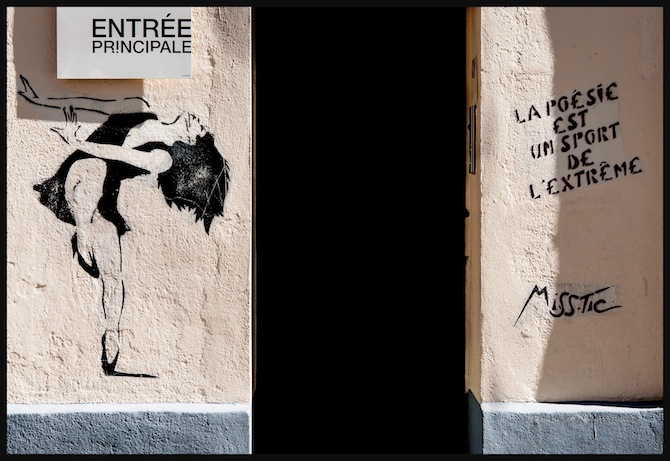 Street art by Miss-Tic
Street art by Miss-Tic
Poetry
- The Narrow Road to the Deep North and Other Travel Sketches by Matsuo Bashō (Seventeenth-century travel writing that chronicles the great Japanese haiku poet's journeys through Japan, interwoven with his poems and his Zen Buddhist vision of eternity in the sensory world around him.)
- The Maximus Poems by Charles Olson (A free-verse epic poem that approaches the Massachusetts fishing town of Gloucester through its characters, its history, its ecosystem, and the poet’s inspired personal and mythical vision as well. It marked a new freer direction in American poetry. And strangely, it seemed to bring my own paternal ancestral history to life in me, though I haven’t lived in Massachusetts since I was three years old.)
- The Iliad by Homer, both Robert Fagles' and Stephen Mitchell's translations (The greatest epic poem ever written on war. My favorite part is always the way the gods and goddesses are characters as real as the humans.)
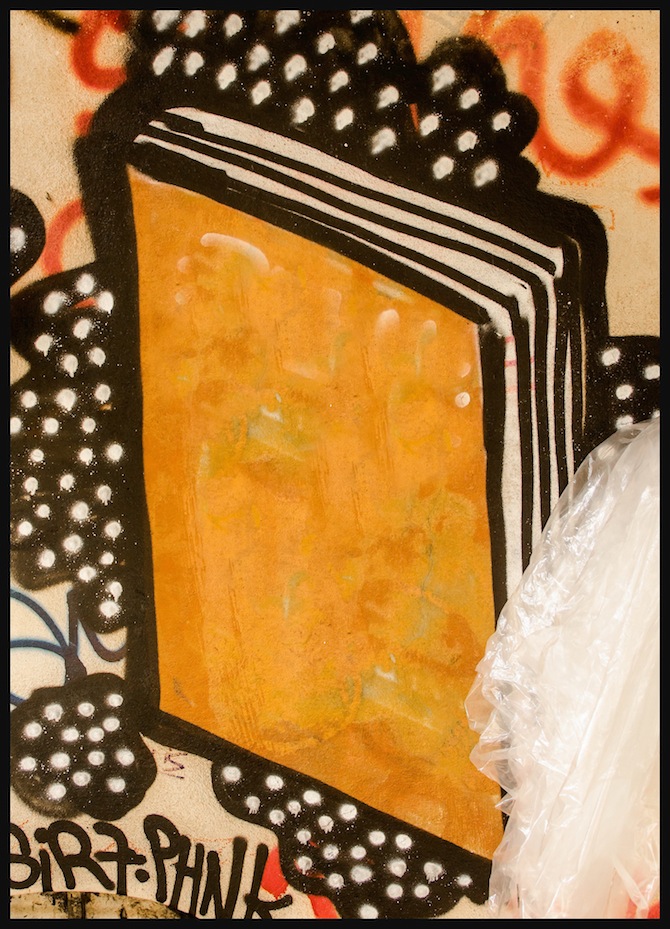
Non-fiction
- The Goncourt Journals (1851-1870) (Two brothers, Edmond and Jules de Goncourt, wrote down everything that happened in their literary and social circles during mid-nineteenth century life in Paris. Casual mention of conversations with Flaubert and Turgenieff spice it up. I loved reading in George Painter’s biography about Proust’s self-pity after he read these journals. Why didn’t he know that many interesting people? And then it dawned on him that he did. Proust spent the rest of his life writing about them.)
- Robert Duncan, The H. D. Book (This is a strange, visionary book, part apprenticeship to his beloved poet idol, Hilda Doolittle, part visionary and poetic musing as befits a book about this great visionary poet.)
- Under the Banner of Heaven by Jon Krakauer (The best writing I know about religious fundamentalism and its intrinsic domination of women, carried right to its ultimate end in the murder of the most clear-thinking, "disobedient" woman, the brother of these two Mormon brothers, and her baby.)
- Eels by James Prosek (An elegant book about the biology and mythology of this strange fish, from New Zealand to the Sargasso Sea, illustrated with beautiful etchings by the author. Most fascinating are the Maori legends about eels as guardians and monster-seducers.)
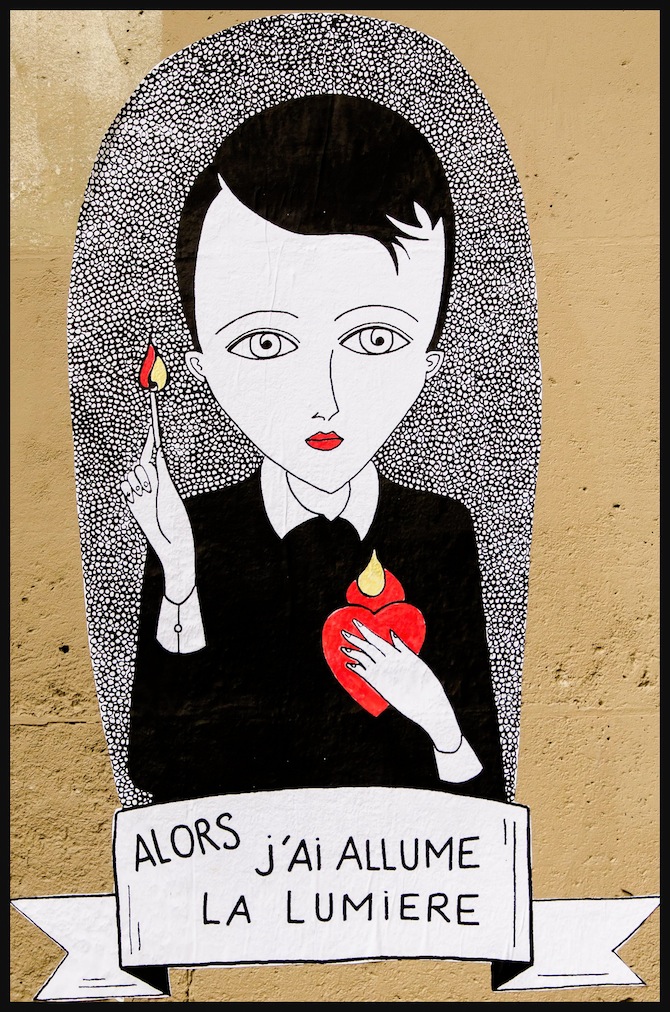 Street art by Fred Le Chevalier
Street art by Fred Le Chevalier
Biography & Autobiography
- Marcel Proust A Biography by George D. Painter (A bookseller at Village Voice Bookshop (sob) lent me his copy. I marked it up with so many colored flags that I had to order a copy for myself, and transfer all the markers in order to have all these treasured facts close at hand.)
- The Pillow Book by Sei Shōnagon (One of the greatest works of Japanese literature, Shōnagon weaves short tales, longer ones, lists, and poems about her life as a gentlewoman in the 10th century Court of Empress Teishi in Heian-kyō (present-day Kyoto). Fascinating for the way poetry, wit and okashi (that which delights) are a part of every aspect of life, and for the exquisite attention to sensory beauty, especially the clothes of both women and men.)
